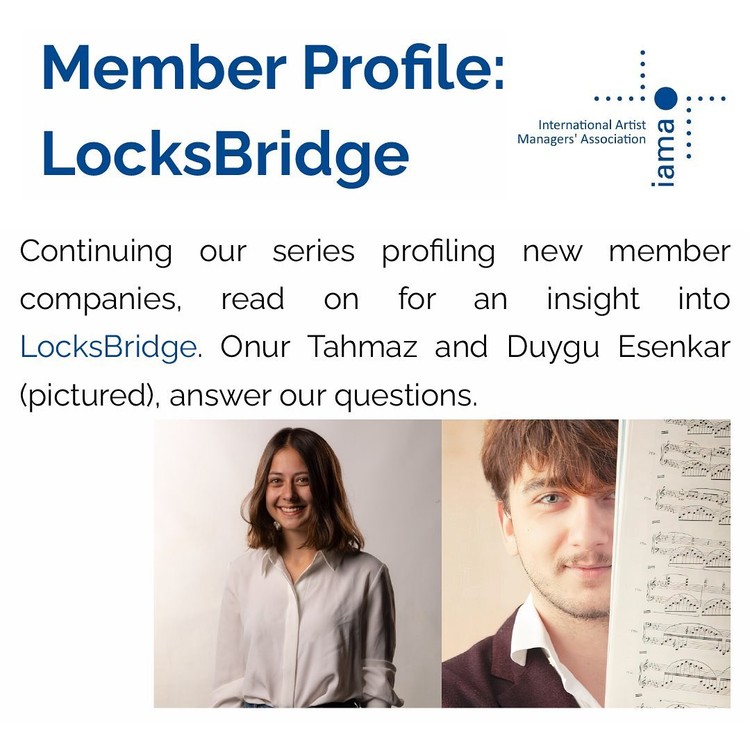
LocksBridge Artist Management Featured in IAMA Member Profile Series
LocksBridge Artist Management is proud to be featured in the International Artist Managers’ Association’s (IAMA) Member Profile series. As the youngest members of this esteemed organization, we are honored to join a community of classical music professionals from all around the world.
Here is the full article:
Q1: How long have you been in the artist management sector and how did you get into it?
Duygu and I launched LocksBridge Artist Management four years ago when we were 22 years old.
It seems a little weird, but we both studied economics at Istanbul’s Bosphorus University, where we also established the Bosphorus Philharmonic Orchestra, Turkey’s first university orchestra at a university without a music department, consisting of 80 people who studied disciplines other than music. I was the conductor and Duygu was the orchestra manager while she was also a violinist in the orchestra. We even gave Ottorino Respighi’s Concerto in Modo Misolidio its Turkish premiere in Istanbul Lütfi Kırdar ICEC, one of Turkey’s largest concert halls.
While we were both studying, I mostly concentrated on neuromarketing, public finance, tax systems, organizational behavior, and data-driven decision making, while Duygu worked on financial accounting, business ethics, finance for creative industries, strategic marketing management, as well as banking and finance.
We have, however, always been drawn to the intersection of business and classical music through entrepreneurship. It’s a widespread myth that entrepreneurs may only specialize in the tech industry, but this is inaccurate. We wanted to pursue our passions after graduation, so we launched Turkey’s first international classical artist management agency—it might sound a little strange, but there wasn’t one.
Duygu and I are currently the IAMA’s youngest members, I believe.
Q2: What do you think the biggest challenges within the sector are?
The absence of young individuals in the sector posed the biggest problem for us, but as I observed at the IAMA conference in Zürich this year, it appears there are more young people nowadays.
Inequalities that include a lack of diversity based on artists’ cultural origins and ages would be another difficulty. Even our job as artist managers is made more difficult by the latter. Most recently, we experienced such unfairness, where a festival disrespected our right to an artist’s exclusivity due to our young age.
Last but not least, from the viewpoint of artists, the position of artist managers may be misinterpreted as someone who merely finds work for the artist. However, the duties of artist managers actually span a wide range of areas, from marketing to audience development, tax and legal systems, and even political analysis.
Q3: What inspired you to join IAMA and what benefits do you feel IAMA offers?
We had to join IAMA since it forms the backbone of our industry. The classical music industry would be unable to keep up without IAMA Conferences. No other gathering during the year provides an equivalent opportunity to observe, meet with fascinating peers, and facilitate artist connections.
Q4: How do you feel social media has contributed or detracted from your role?
It can and does make a significant contribution. The opportunities provided by social media are immense. We can communicate with folks we’ve never encountered before and encourage them to seek classical music.
Nevertheless, it also occasionally pushes listeners away from artistic excellence in favor of popularity. For us, presenting high-quality music is much more crucial than selling tickets. When attempting to achieve something, one should not disregard the other.
Regardless of how good or bad their music is, artists who have mastered audience-friendly online behavior are typically acclaimed; in fact, promoters will prioritize an artist’s social media presence as they consider potential sales. Many artists hire consultants to manage their social media accounts for them, yet this may be incredibly pretentious. In this context, the main challenge for the artist manager is to let the artist realize whether their real personality contradicts with their online presence.
Q5: What advice would you give to people at the start of their artist management careers.
They should be honest and forthright to both artists and their coworkers in festivals, concert halls, and orchestras. Then, everything will develop just as it should.
The necessity for a much deeper awareness of varied expertise, such as in digital footprint, arises since managing an artist has become particularly complex. They ought to add fresh perspectives to the business and help modern management techniques advance.
Interview by Ed Gimson, Coordinator for Membership & Administration.
